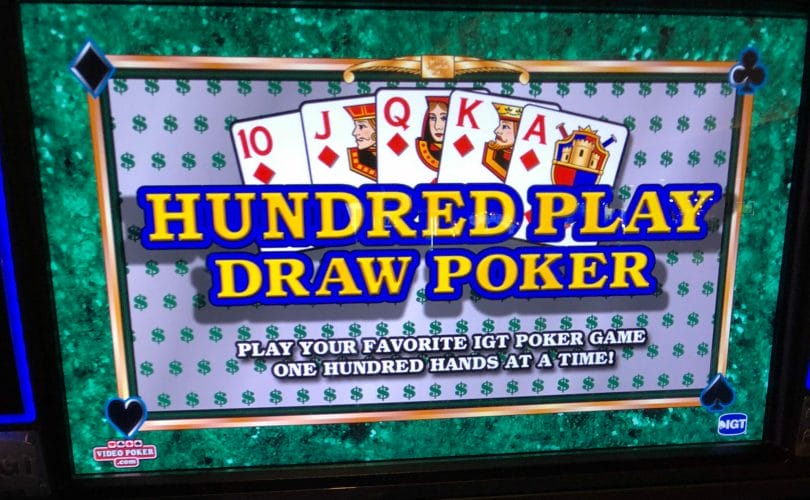Poker Running It Multiple Times
This is a very good example by @Shashank. I just want to say that I had to add join at the end, or else the two processes were not running simultaneously. From multiprocessing import Process import sys rocket = 0 def func1: global rocket print 'start func1' while rocket. A shorter series designed for locals and those a short drive away, DeepStack Showdown Poker Series events typically run from one to two weeks at a time. They offer multiple buy-ins each day of varying amounts to appeal to a range of players.

A poker run is an organized event in which participants, usually using motorcycles, all-terrain vehicles, boats, snowmobiles, horses, on foot or other means of transportation, must visit five to seven checkpoints, drawing a playing card at each one. The object is to have the best poker hand at the end of the run. Having the best hand and winning is purely a matter of chance. The event has a time limit, however the individual participants are not timed.
According to the Guinness Book of World Records, the record for the largest event was set in 2009 with 2,136 motorcyclists benefiting the Fallen Firefighter Survivors Foundation (FFSF).[1]
The record for the largest single venue event was set in 2012, with 586 motorcyclists raising money for Prostate Cancer research in Ottawa, Canada.[2]
Variations[edit]
Poker runs usually require a fee to enter and some for each additional hand; in some events a small part of the fee may go to funding the event, including the prizes, while the rest goes to the event's charity recipient or club treasury. In charity events usually most, if not all of the funds goes to the selected charity. Prizes, such as money, plaques, or merchandise donated by commercial sponsors of the event, are awarded for the best hand. Some runs will award smaller awards for lower hands or even the lowest hand.
Each checkpoint might offer food or entertainment, either covered by the entry fee or at additional cost. Each participant is responsible to maintain the integrity of their hand during the run. Hands are usually written down or marked with punched holes on a ticket, rather than assembled from actual cards given to the riders. The only requirement is that riders arrive at the final checkpoint by the time prizes are awarded, usually near the end of the day, typically at a party with food and refreshments. It might be required that participants collect all of the requisite number of cards, five or seven, or they might be allowed to miss checkpoints and use a hand with fewer cards, though the odds of a winning hand are much lower.
Transport[edit]
Although most events are on motorcycles, off-road vehicles, boats, or horses, events involving small aircraft, ATVs, bicycles, golf carts, snowmobiles,[3] skateboards,[4] running,[5] canoeing and kayaking,[6] and geocaching[7] have been held.
Dice run[edit]
A dice run is one variation, where instead of collecting cards, participants roll dice at each stop. The object is to have the highest score as determined by the sum of the dice rolls.
See also[edit]
Notes[edit]
- ^'Largest motorcycle Poker run - Guinness World Records Blog post - Home of the Longest, Shortest, Fastest, Tallest facts and feats'. Community.guinnessworldrecords.com. 2009-04-18. Archived from the original on 2009-05-09. Retrieved 2012-05-16.
- ^'Largest motorcycle poker run (single venue)'. 2012-11-06. Retrieved 2013-02-26.
- ^[1]Archived July 5, 2008, at the Wayback Machine
- ^'Poker Run', Silverfish Longboarding - The Longboard Skateboard Community - P - General Longboard Glossary, archived from the original on 12 December 2007, retrieved 2010-07-02
- ^[2]Archived August 16, 2009, at the Wayback Machine
- ^Waterloo-Cedar Falls Courier: Canoe/kayak poker run will benefit ill children
- ^Geocaching.com: First Annual Lillington Poker Run
References[edit]

External links[edit]
| Wikimedia Commons has media related to Motorcycle events. |
Poker Running It Multiple Times Daily
When playing a no-limit hold’em cash game, you may find yourself all in for a big pot and be offered a chance to “run it” multiple times. This means that the remaining streets will be dealt more than once which increases the likelihood that the pot will be split and proportionally awarded.
For example, let’s say you have pocket aces and get it all in on the flop against your opponent’s flush draw. If you agree to run it twice, the turn and river will be dealt as usual. Then, a second turn and river will be dealt as well. If either player win both times, that player is awarded the entire pot. If each player wins one time, each is awarded half of the pot.
Poker Running It Multiple Times Crossword

In these situations, agreeing to run it twice (or three times or more) has several consequences, not just on the particular hand but on other aspects of the game as well. Next time you face such a decision, consider these five effects of running it multiple times.
1. Effect on the Odds
Poker Running It Multiple Times Calculator
Running it multiple times does not increase either player’s chance of winning the pot. However, many people believe that running it multiple times benefits one player or the other. Let’s look more closely at whether or not this is the case.
Let’s call the player who is ahead when the decision is made to run it multiple times the “Hero” and the player who is behind the “Villain.” If the Villain has an approximately 35% chance of hitting his flush draw and winning the entire pot when running it once, he has that same 35% chance of scooping when running it twice — or ten times, for that matter.
The only thing running it multiple times does is lessen the effect of variance and luck. In this example, we know that the Villain has a decent chance to hit his flush and win the pot if we only run it once. If that happens, the Hero gets nothing.

But what happens if we get crazy and decide to run it 20 times? In probability theory, there is something known as the “Law of Large Numbers.” It states that the more times we run it, the closer the actual result will be to the theoretical result. This means that there is a very good chance that the Villain will actually win 35% of the time, or 7 of the 20 runs. Thus does running it multiple times lessen the element of luck in the game.
2. Effect on Hero’s Luck
Running it multiple times reduces the chance that Hero will suffer a suck out and thus win nothing. All poker players know the pain of getting their money in good only to get unlucky when all the cards are dealt. Having a chance to run it twice (or more) and likely win some of our money back seems like a good thing. However, there is a flip side to reducing the chance that Hero gets unlucky.
3. Effect on Villain’s Luck
Running it multiple times reduces the chance that Villain gets lucky and wins the entire pot. Some recreational players live for the chance to get their money in bad and suck out on some wannabe pro. The fact that running it once occasionally allows them to get lucky and win it all is what keeps them in the game. If they never got lucky, then such players would likely lose their money too quickly and the game would quickly dry up. As crazy as it sounds, you should be thankful for suck outs because without them your opponents would not be willing or able consistently to get it in bad against you.
4. Effect on the Atmosphere
Running it multiple times is harmful to the Ozone layer. Just kidding. What I mean is if you are playing in a friendly game with a fun atmosphere, denying someone’s request to run it multiple times may cause the table to turn on you. Winning players ought to do what they can to keep the other players happy. Regardless of what the math says, you cannot win any more from players who refuse to play with you.
5. Effect on the Dealer
Running it multiple times can cause the dealer to do more for less. I’ve seen players get it all in preflop and then agree to run four separate boards in a coin flip situation. Not surprisingly, the pot was chopped evenly. Since neither player felt like he won, neither of them tipped the dealer. She spent more time and did more work than usual, but received no pay. If you run it multiple times and chop the pot, consider tipping the dealer a bit more than you normally would since she is doing more work.
When deciding whether or not to agree to run it multiple times in a cash game, consider how doing so lessens variance and the “gamble” of the game, but also keep in mind other effects, too, including how doing so can influence the table dynamic going forward.
Poker Running It Multiple Times
Photo: Jean-Robert Bellande.
Get all the latest PokerNews updates on your social media outlets. Follow us on Twitter and find us on both Facebook and Google+!
Tags
no-limit hold'emcash game strategyrunning it twicerulesoddsprobabilitypoker mathRelated Room
Full Tilt